Progressive prosecutors are encountering pushback
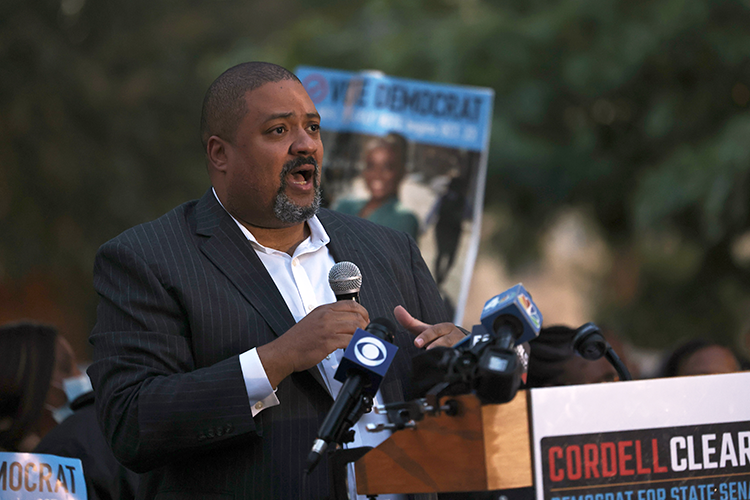
Alvin Bragg Jr. ran for district attorney of New York County in 2021 as a progressive prosecutor. (Photo by Michael M. Santiago/Getty Images)
When Alvin Bragg Jr. ran for district attorney of New York County last year, he broadly promised to decline prosecuting some defendants arrested for low-level crimes, prioritize treatment for mental illness and drug abuse, and to end the use of cash bail.
Two days after officially becoming the Manhattan district attorney in January, Bragg, a former federal prosecutor and deputy state attorney general, issued a memo instructing assistant district attorneys to decline to prosecute people arrested for farebeating, certain trespasses, resisting arrest and additional crimes unless the defendant also allegedly committed a felony in the same incident. It also said certain armed robberies of commercial establishments should be prosecuted as misdemeanors.
The memo sparked immediate and widespread condemnation by the police, conservative-leaning New York Post and other critics, some of whom urged Gov. Kathy Hochul to remove Bragg.
Bragg formalized a rollback in a new memo a month later said defendants who rob commercial establishments with guns will be charged with felonies, regardless of whether the gun is operable, among other policies.
Bragg isn’t the only reform-minded district attorney to encounter public pressure. In San Francisco, District Attorney Chesa Boudin, elected in 2019 on a progressive platform, was recalled June 7. In Los Angeles, not only are critics attempting to recall District Attorney George Gascón, who took office in December 2020, but the union that represents prosecutors in his office is suing him on the grounds that his policies violate the state’s tough sentencing laws.
Prosecutors have to work with the police, the courts and their own staff, including longtime attorneys for whom a “progressive” approach represents a turnaround from the way they have practiced in the past, says criminal law professor David Alan Sklanksy of Stanford Law School. No matter their pledges, he adds, almost all have experienced pushback.
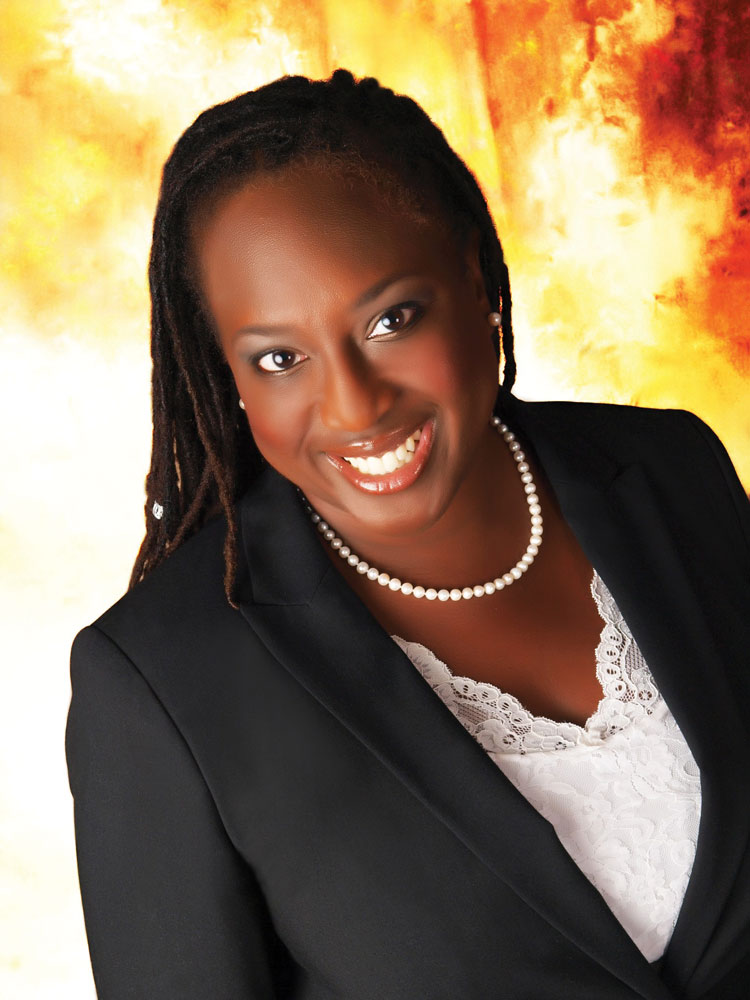 Melba Pearson is co-chair of the ABA Criminal Justice Section’s Prosecution Function Committee.
Melba Pearson is co-chair of the ABA Criminal Justice Section’s Prosecution Function Committee.Melba Pearson, a former prosecutor in Miami-Dade County and current co-chair of the ABA Criminal Justice Section’s Prosecution Function Committee, says supporters of a progressive approach have sometimes been frustrated with the slow pace of change.
“People don’t understand that progress doesn’t happen overnight,” she says.
Some conservatives, Pearson adds, support progressive policies due to the high cost of incarceration, but others argue that anything other than a traditional law-and-order approach will endanger the public.
Bragg, Boudin and Gascón are part of a wave of “progressive” prosecutors who were elected after running on platforms that include reducing incarceration rates, which swelled as a result of tough-on-crime policies of prior decades.
Some of the first of these progressive prosecutors, such as Marilyn Mosby in Baltimore, were elected in the mid-2010s. The movement spread quickly, and by 2021, progressive prosecutors could be found in cities and towns across the country, according to Sklansky. The term “progressive” itself is fluid, and the prosecutors’ platforms weren’t uniform. For instance, some campaigned on promises to avoid seeking the death penalty, while others have promised to end cash bail.
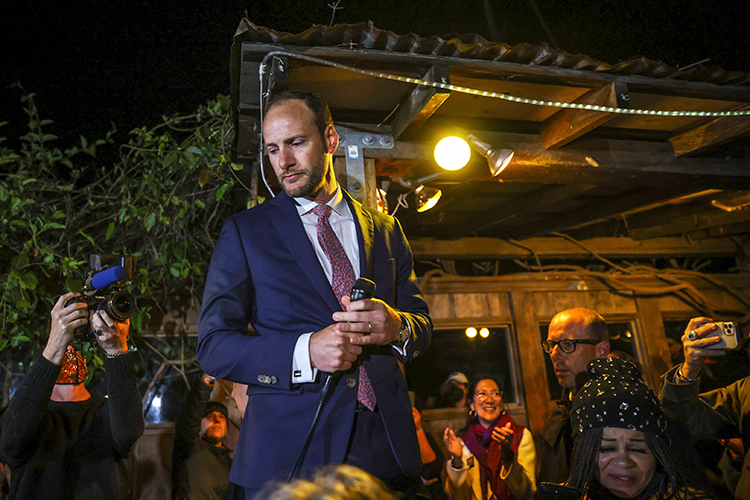 Chesa Boudin conceded at his recall election on June 7 and was ousted as district attorney. (Gabrielle Lurie/San Francisco Chronicle via AP)
Chesa Boudin conceded at his recall election on June 7 and was ousted as district attorney. (Gabrielle Lurie/San Francisco Chronicle via AP)
San Francisco
Boudin’s critics pointed to high-profile crimes that roiled the city as cause for removing him from office.
“We have seen over the past two and a half years that Mr. Boudin has opted to greatly ramp up the diversion or dismissal, rather than the accountability in the traditional sense,” says Richie Greenberg, a leading Boudin critic, political commentator who now identifies as an independent and former Republican mayoral candidate.
In one high-profile April 2021 case, 26-year-old Joseph Williams, who was charged with murder in the death of a 7-month-old baby, previously had been arrested twice on domestic violence charges but wasn’t charged in either case. Boudin’s office said both the alleged victim, identified only as “TB” (who is not the mother of the baby Williams is accused of killing), didn’t want to press charges and “the evidence could not prove that Mr. Williams, rather than the other party in the altercation, was criminally responsible for the incidents.”
Boudin’s supporters say recall proponents unfairly blamed him for incidents that can occur anywhere.
“In some number of cases, there will be an unforeseen tragedy, and the politicization of that has been a tactic that’s been used for a very long time, and is clearly selectively being used right now,” says Julie Edwards, spokesperson for the anti-recall group Friends of Chesa Boudin.
Supporters also say recall advocates were misleading voters about crime.
Crime rates
Researchers from Rutgers University, Texas A&M University and New York University who examined the impact of prosecutorial reforms in 35 jurisdictions say in a report that they found “no significant effects of these reforms on local crime rates.”
“Local crime rates are driven by lots and lots of factors, so we wouldn’t necessarily expect a district attorney’s policies to affect the rate at which individuals commit criminal offenses,” says report co-author Anna Harvey, an NYU professor of politics and the director of the school’s Public Safety Lab.
People tend to be “myopic” when committing crimes, she says, meaning they aren’t thinking about the possibility of future prosecutions; rather, they commit crimes opportunistically, based on factors such as whether an area is poorly lit, or has no visible police presence or surveillance cameras.
The San Francisco Chronicle, which analyzed data comparing the first quarters of 2018 through 2022, reported in April that data obtained from the police department “does not clearly show a trend toward worsening public safety.”
The newspaper said that some crimes in San Francisco, including murders and shootings, increased from 2018, but less so than in other cities, while rapes, robberies and assaults in San Francisco decreased during that time.
During the pandemic, some property crimes, including burglaries, increased—coinciding with residents’ departures from the city—but later went down to pre-pandemic levels. Shoplifting, on the other hand, has increased.
And New York City, for instance, saw 9,091 reports of robberies citywide (including not only Bragg’s county of Manhattan, but also Brooklyn, the Bronx, Queens and Staten Island—which have their own district attorneys) between January 1 and July 17 of this year. This is an increase of 39% over the same time period in 2021, but 7.3% lower than in 2010 and 79.8 lower than in 1993.
Prosecutorial discretion
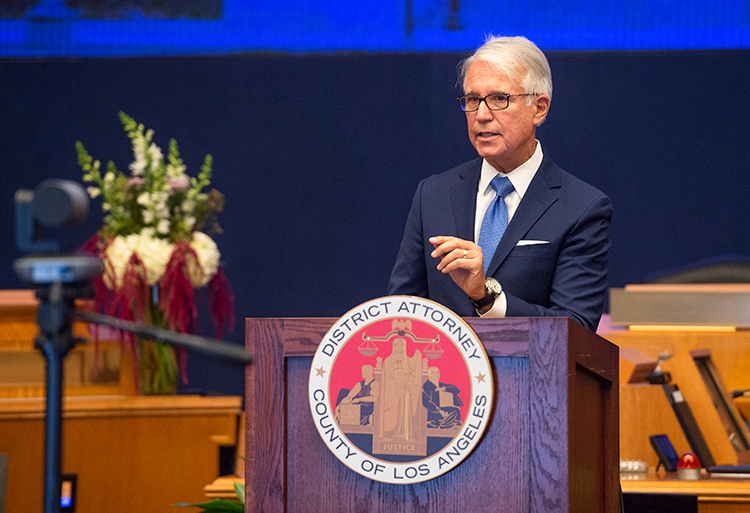 George Gascón assumed office after defeating the incumbent Los Angeles County district attorney, Jackie Lacey. (Bryan Chan/County of Los Angeles via AP, File)
George Gascón assumed office after defeating the incumbent Los Angeles County district attorney, Jackie Lacey. (Bryan Chan/County of Los Angeles via AP, File)When Gascón, a former police officer, took office as Los Angeles County district attorney in December 2020, he directed his prosecutors to stop charging juveniles as adults, stop seeking the death penalty and to stop filing some so-called “three-strike” cases.
Within two weeks, Gascón rolled back some of his prior order by allowing prosecutors in “appropriate” or “extraordinary” circumstances to seek sentencing enhancements for some crimes.
California’s “three strike” law says prosecutors “shall plead and prove” defendants’ prior serious or violent felony convictions, but the law also empowers prosecutors to move to strike those convictions.
The prosecutors’ union, the Association of Deputy District Attorneys for Los Angeles County, sued Gascón several weeks after he took office, arguing that the law requires prosecutors to charge some defendants with “three strikes” offenses.
“Gascón enjoys wide—but not limitless—discretion in exercising his prosecutorial functions,” the union argued when it sought a restraining order against the district attorney.
In a February 2021 ruling, Los Angeles County Superior Court Judge James Chalfant enjoined Gascón from prohibiting some “three strike” prosecutions, writing that Gascón’s “disregard of the three strikes ‘plead and prove’ requirement is unlawful,” as is the directive “to seek dismissal of pending sentencing enhancements without a lawful basis.”
Gascón appealed that ruling to the California Court of Appeal, Second Appellate District, arguing that the order “runs counter to the district attorney’s public responsibilities and strips the district attorney of his constitutionally protected discretion.”
In June, the appeals court partially upheld the injunction, including a provision requiring Gascón’s office to file “strikes” in all eligible cases.
Gascón is appealing to the California Supreme Court.
“This decision sets a dangerous precedent. The court is effectively taking the charging decision out of the prosecutor’s hands—the core function of a prosecutor’s office,” his office stated July 14.
Critics say Gascón is interpreting prosecutorial discretion too broadly.
“Prosecutorial discretion, properly understood, is when the prosecutor on a case-by-case basis decides whether the crime that the person allegedly violated merits alternative treatment,” says Cully Stimson, a senior legal fellow at the Heritage Foundation.
Blanket policies, including declining to bring three-strikes cases, “is not a proper use of prosecutorial discretion,” Stimson adds, and amount to “prosecutorial nullification.”
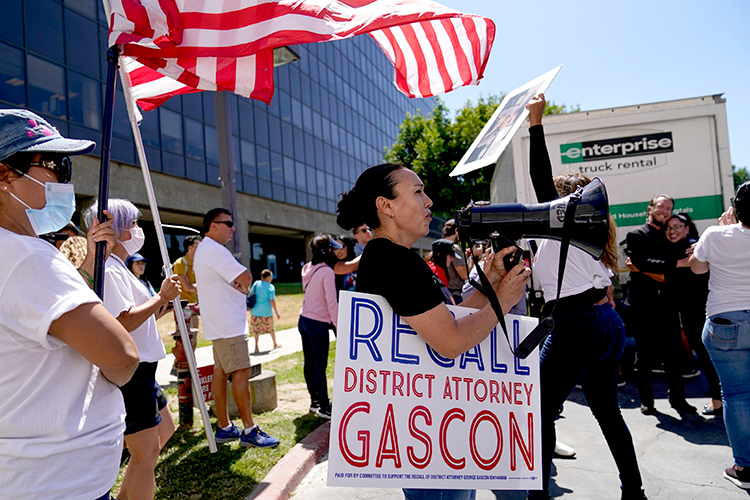 Supporters of a campaign to recall George Gascón gather to view a truck full of recall petitions outside the Los Angeles County Registrar of Voters on July 6 in Norwalk, California. (AP Photo/Ashley Landis)
Supporters of a campaign to recall George Gascón gather to view a truck full of recall petitions outside the Los Angeles County Registrar of Voters on July 6 in Norwalk, California. (AP Photo/Ashley Landis)
Perception versus reality
Still, voters in some of the highest profile races have so far stuck with reform-minded prosecutors.
Progressive district attorneys Kim Foxx of Cook County, Illinois, was reelected in 2020, as was Philadelphia’s reform-minded Larry Krasner in November 2021 and Baltimore’s Mosby in 2018. Mosby is facing trial for perjury and mortgage fraud, according to the Baltimore Sun. She and her lawyers claim federal prosecutors are retaliating against her for her stances as a state prosecutor.
“The best evidence that the movement is not going to be destroyed by those increases is the election results,” says Stanford’s Sklansky.
At the same time, Boudin’s defeat may prompt progressive prosecutors as well as people who aspire to be elected district attorney to address public perceptions about crime.
“District attorneys are elected positions in the United States, and perceptions matter in addition to underlying realities,” Sklansky says.
Updated on Jul 22 to add information about Marilyn Mosby. Updated on July 28 to identify Richie Greenberg as an independent.



